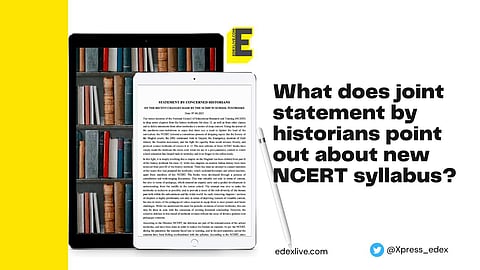

In response to the recent changes introduced by the National Council for Educational Research & Training (NCERT) to their school textbooks for the academic year 2023-24, over 250 prominent historians including Romila Thapar, Jayati Ghosh, Uma Chakravarti, Apoorvanand and Irfan Habib issued a public statement on Friday, April 7, condemning the exercise and demanding that the changes be removed.
The statement, which EdexLive is in possession of, terms the decision “to drop entire chapters from the history textbooks for class 12, as well as from other classes and to delete statements from other textbooks” as a “matter of deep concern”, and alleges that the deletions betray a “non-academic, partisan agenda”.
The NCERT, says the statement, initiated a “contentious process” of dropping topics like the history of the Mughal courts, the 2002 communal riots in Gujarat, the Emergency, mention of Dalit writers, the Naxalite movement, the Industrial Revolution, and the fight for equality from social science, history, and political science textbooks of Classes VI to XII, all the while using the argument of needing to cut down syllabus content due to the pandemic induced-lockdowns.
No prior consultation with earlier authors of textbooks
The statement also questions NCERT for allegedly not consulting experts who had worked on the previous editions of the textbooks outside of the NCERT during the rationalisation exercise. These experts include historians and teachers of history alike. The statement further says that the books were developed through a process of consultation and wide-ranging discussions, and excluding them would not only remove valuable content from the books, but also their organic unity and a graded development in understanding from the middle to the senior school.
Exercise reflects a communal mindset
While the authors of the statement understand the importance of periodic revisions to existing syllabi, they state that it must be done in sync with the consensus of existing historical scholarship — and that selective removal of content in this edition of the textbooks only reflects the sway of divisive politics over pedagogical concerns.
The statement further goes on to say that the deletion of the chapter titled Kings and Chronicles: The Mughal Courts from part-II of the textbooks and retention of the equally important Vijayanagara Empire leads to the deeply problematic idea of a Hindu era, Muslim era and so on, in Indian history. “These categories are uncritically imposed on what has historically been a very diverse social fabric,” the statement continues.
The statement deems it important to stress that this step by the NCERT to remove entire chapters and portions of texts from the history textbooks is not based on any academic consideration — but instead, are those which are not in line with the “pseudo-historical schema of the ruling dispensation”.
“Removing entire periods of history from history textbooks would not only perpetuate misconceptions and misunderstandings, but would serve to further the divisive communal and casteist agenda of the ruling elites,” the statement says.
False understanding of history
What the authors of the statement are most concerned about, regarding this exercise, is how it is detrimental to the common understanding of history.
They argue that by removing topics on the Mughal Empire and caste and gender relations, Indian society is being misconstructed as a product of a single, hegemonic tradition devoid of conflict or contradiction and that the categorisations like “Hindu society” are being imposed on a very diverse social fabric uncritically.
This, they say, “...reduces state formations, empire-building and transformations of the mediaeval period to an unsubstantiated, perennial contest between an allegedly homogenous ‘Hindu’ society and ‘Islamic’ invaders and rulers” — the kind of “pseudo-history” being circulated on social media platforms like WhatsApp.
Impact on history education
These sweeping deletions will have an adverse impact on how history is taught and learned, the authors of the statement fear.
“Excising any period from the study of the past would make students unable to comprehend the connecting thread of the past with the present times, and would deprive students of an opportunity to connect, compare and contrast the past and the present, and would disrupt the organic interconnectedness of the subject-matter of the discipline,” the statement reads.
The statement further says that the earlier NCERT books, which were designed to make students understand India as a melting pot of diverse cultures, ethnicities, groups and more, will now fail to teach them about the craft of history and to develop critical thinking about the past.
“The composite heritage of the Indian subcontinent and historical genealogies of the present times were the main focus of the old NCERT syllabus from which chapters have now been strategically excised,” says the statement.
Countering the currents
The statement, which was signed by eminent historians from renowned educational institutions like Delhi University, Jawaharlal Nehru University, Hyderabad Central University, Azim Premji University and more, lays out the demand that the changes be rescinded as early as possible.
Talking about how the academic fraternity would fight this move, one of the petitioners, Dr Maya John, Labour Historian and Member of the Academic Council, University of Delhi says that they must challenge this exercise at every public platform they have — be it at the media or on public forums.
“We will also be working with teachers of history and actual historians to ensure that a right understanding of the study of history is inculcated in the public. In addition, we would also leverage the support of the Indian History Congress to challenge this in a more systematic manner,” she elaborated.
The statement, the professor says, is continuing to receive more endorsements. “As of the afternoon of April 8,” she says, “the statement has about 300 signatures.” She further stated that they plan to circulate the statement further and ensure that more discourse is generated around this exercise.
